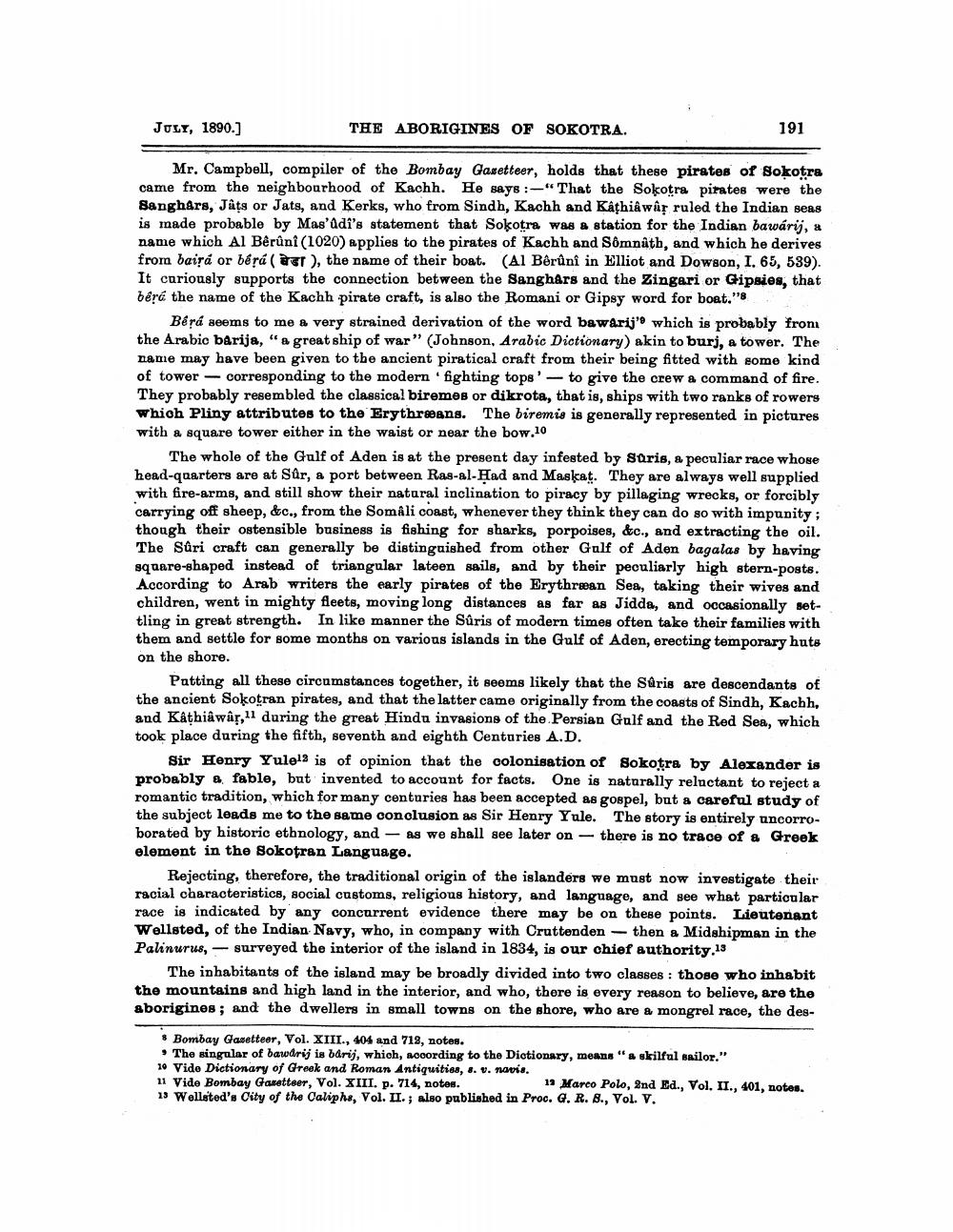________________
JULY, 1890.]
THE ABORIGINES OF SOKOTRA.
191
Mr. Campbell, compiler of the Bombay Gazetteer, holds that these pirates of Sokotra came from the neighbourhood of Kachh. He says :-"That the Sokotra pitates were the Sanghars, Jâţs or Jats, and Kerks, who from Sindh, Kachh and Kathiâwâr ruled the Indian seas is made probable by Mas'udi's statement that Soķotra was a station for the Indian bawarij, a name which Al Bêrûni (1020) applies to the pirates of Kachh and Somnath, and which he derives from bairá or bērá (as), the name of their boat. (Al Bêrûni in Elliot and Dowson, I. 65, 539). It cariously supports the connection between the Sanghars and the Zingari or Gipsies, that bêrá the name of the Kachh pirate craft, is also the Romani or Gipsy word for boat."
Bérá seems to me a very strained derivation of the word bawarij' which is probably from the Arabic barija, "a great ship of war" (Johnson, Arabic Dictionary) akin to burj, a tower. The name may have been given to the ancient piratical craft from their being fitted with some kind of tower corresponding to the modern fighting tops' - to give the crew a command of fire. They probably resembled the classical biremes or dikrota, that is, ships with two ranks of rowers which Pliny attributes to the Erythraeang. The biremis is generally represented in pictures with a square tower either in the waist or near the bow.10
The whole of the Gulf of Aden is at the present day infested by Suris, a peculiar race whose head-quarters are at Súr, a port between Ras-al-Had and Masķat. They are always well supplied with fire-arms, and still show their natural inclination to piracy by pillaging wrecks, or forcibly carrying off sheep, &c., from the Somali coast, whenever they think they can do so with impunity; though their ostensible business is fishing for sharks, porpoises, &c., and extracting the oil. The Sari craft can generally be distinguished from other Gulf of Aden bagalas by having square-shaped instead of triangular lateen sails, and by their peculiarly high stern-posts. According to Arab writers the early pirates of the Erythrean Sea, taking their wives and children, went in mighty fleets, moving long distances as far as Jidda, and occasionally settling in great strength. In like manner the Sûris of modern times often take their families with them and settle for some months on various islands in the Gulf of Aden, erecting temporary huts on the shore.
Patting all these circumstances together, it seems likely that the Sûris are descendants of the ancient Soķotran pirates, and that the latter came originally from the coasts of Sindh, Kachh, and Kathiâwîr, 11 during the great Hindu invasiong of the Persian Gulf and the Red Sea, which took place during the fifth, seventh and eighth Centuries A.D.
Sir Henry Yule is of opinion that the colonisation of Sokotra by Alexander is probably a fable, but invented to account for facts. One is naturally reluctant to reject a romantic tradition, which for many centuries has been accepted as gospel, but a careful study of the subject leads me to the same conclusion as Sir Henry Yule. The story is entirely uncorroborated by historic ethnology, and as we shall see later on - there is no trace of a Greek element in the Sokotran Language.
Rejecting, therefore, the traditional origin of the islanders we must now investigate their racial characteristics, social customs, religious history, and language, and see what particular race is indicated by any concurrent evidence there may be on these points. Lieutenant Wellsted, of the Indian Navy, who, in company with Cruttenden - then a Midshipman in the Palinurus, - surveyed the interior of the island in 1834, is our chief authority.18
The inhabitants of the island may be broadly divided into two classes : those who inhabit the mountains and high land in the interior, and who, there is every reason to believe, are the aborigines; and the dwellers in small towns on the shore, who are a mongrel race, the des
& Bombay Gasetteer, Vol. XIII., 404 and 712, notes. • The singular of bawdrij is bdrij, which, according to the Dictionary, means "a skilful sailor." 10 Vide Dictionary of Greek and Roman Antiquities, 8. v. navia. 11 Vide Bombay Gazetteer, Vol. XIII. p. 714, notes.
13 Marco Polo, 2nd Ed., Vol. II., 401, notes. 13 Wellsted's City of the Caliphs, Vol. II. ; also published in Proc. G. R. B., Vol. V.




